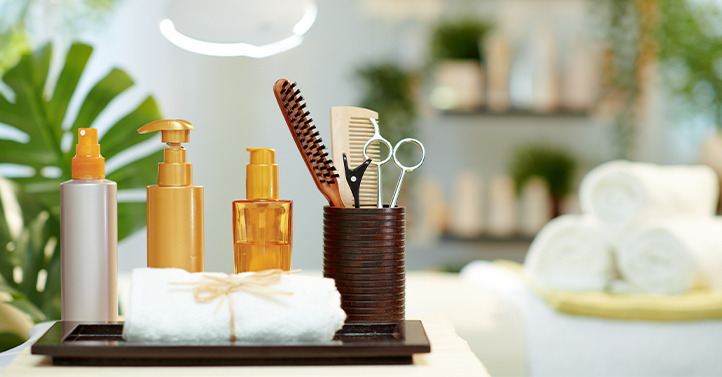Salons and spas, in an effort to become more eco-conscious and offset their emissions, are partnering with companies that offer salon recycling solutions — and are recovering nearly 100% of their beauty waste in the process. With the salon industry churning out roughly 421,000 pounds of waste per day, we’re not just talking about a few empty shampoo bottles.
Companies that Are Playing for Keeps
Green Circle Salons is one of the leaders in this arena. The company, which has been active in the United States since 2014, provides a seamless process for salons to offset their emissions and recover up to 95% of their beauty waste. Green Circle Salons has been certified by B Corporation and the Carbon Trust, which means that it is meeting the highest standards of environmental and social responsibility. In fact, Green Circle Salons is the sole waste management company in North America that meets all the requirements for Zero Waste to Landfill Certification.
SalonCycle, formed through a partnership between TerraCycle and Salon Centric, enables salons to recycle a number of different waste streams commonly found in salons, including metals (used color tubes and foils); plastics (product lids and containers, rigid plastics, beverage bottles, and color tube lids); paper (magazines, newspapers, paper packaging, cardboard, and coffee cups); hair (processed and virgin); breakroom waste (coffee capsules, straws, chip bags, candy wrappers, and disinfecting wipes); PPE (disposable gloves, face masks, and disposable garments); and excess color (color, toner, and lightener), among other professional beauty product waste.
Green Life Organization (GLO), another leading salon waste-recycling program, enables salons to recycle previously non-renewable items. GLO, which was launched in January 2020, donates a portion of every dollar that is spent by salons on GLO services to its environmentally conscious non-profit partners.
Beauty Companies Are Forming Their Own Programs
Some of the professional beauty brands, like Davines Group, amika, and Estée Lauder, have introduced their own sustainability programs. In 2020, Davines Group launched its global Sustainable Salon Program, a training and certification program that consists of three modules — on the planet, leadership, and community and people — to educate hairdressers on the importance of committing to the planet. Upon completion, program participants receive a certification from the University of Parma.
In November 2022, Amika partnered with TerraCycle to form a free national recycling program for the brand’s hair care packaging. Through the Amika Recycling Program, consumers send their Amika hair care packaging — including tubes, bottles, trigger heads, complex closures, and tinted glass — to TerraCycle, where they are cleaned, melted, and converted into hard plastic that can be remolded into new recycled products, such as park benches and picnic tables. For aerosol packaging, Amika has a separate program — its “Amika Aerosol Recycling Program” — also through its relationship with TerraCycle.
Aveda’s Returnable Shipper Program was created in partnership with Returnity, which offers reusable, circular solutions that address shipping- and delivery-packaging waste generated by e-commerce. The Returnable Shipper Program, which is still being piloted, enables consumers to reduce their packaging waste with returnable and reusable shipping boxes.
Salons Are Embracing the “Every Little Bit Helps” Approach
Salons and spas are stepping up to the sustainability plate in other ways too. For example, they are focusing on their water usage by checking pipes and faucets for drips and leaks, installing water-saving showerheads, and ensuring that only full loads of laundry are run to reduce both water and electricity usage.
They are also curtailing their energy usage by switching to energy-efficient bulbs; turning off electrical appliances like curling irons, dryers, and lights when not in use; and ensuring that the switches on computers, copy machines, and other such equipment are flipped to “off” once the salon is closed.
Other steps that are being taken are reducing hair-color waste — there are hair-coloring measurement systems that help salons ensure that only the needed amount is mixed. Salons are also switching to green salon products — e.g., Paper Not Foil, which is made for coloring, is produced from recycled construction waste (no trees) and can be washed and reused — and green cleaning products. In addition, some salons are opting to only use manufacturers and suppliers that have committed to sustainable operations and product lines.
For more information, check out Kline’s Sustainability in Professional Beauty: U.S. Market Assessment. The report, which an provides overview of the best practices and initiatives relating to sustainability initiatives conducted by participants in the U.S. professional beauty market, spanning the hair care, nail care, and skin care sectors, will be published this month.

